I generally do a yearly update on my schedule, where I’ve been, where I am, and where I’m going. Below, you’ll see the past few January updates. For the most up to date information on what I’m doing, check out my monthly newsletter:
www.aaronroth.net/category/monthly-newsletter/
——————————-
January 2014 Update:
I hope you all have had a wonderful start to the new year. I returned to Lima, Peru soon after our annual meeting with Edify in San Diego, California where our central office is located. Peru is in the middle of summer and it’s great weather (so strange to be on this side of the equator!). We’re really excited to start doing our first microloans here in Lima in the next few weeks because schools are out for the summer and are looking to expand their operations. Schools look for financing for their construction projects during this time period and often find loans from banks that charge them very high interest rates. For us, it’s an excellent opportunity to connect with them about our small business loans and business training, and to share with them our vision for education in Peru. -Aaron
- Download this email as a pdf: Aaron Roth – Jan. 2014 Update.pdf
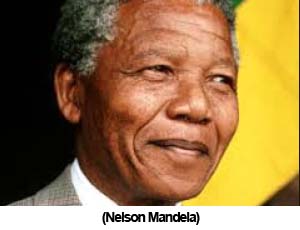
“Education is the most powerful weapon we can use to change the world.”
– Nelson Mandela
I had the opportunity to reconnect with my colleagues in Edify early this January in San Diego. Because we work in six countries (seven, if you count our own country) we see each other but once a year. Most meetings are carried out via Skype, and the preferred method of communication is via email. Yet, we are all drawn to the organization for the same reason. As I talked with each colleague I realized that we really do believe in our mission:
To improve and to expand sustainable, affordable, Christ-centered education in the developing world.
But why do we believe this, I thought, as we gathered around the table. I know that we use language like this all the time when we talk about improving the economic outlook of developing countries, and how we can help people out of poverty. Do we really believe that education can make a difference in this way and why does it matter that we bring Christ into the initiative of building better schools?
One night, we left the meeting rooms and went to a local restaurant to have dinner and to relax from the previous days’ meetings. I looked around the table and was amazed to see individuals from so many countries. We had Ghanaians, an Ethiopian, a Ugandan who now lives in Rwanda, a Dominican and Americans from just about every corner of our country, certainly every coast. I know this sounds like I’m about to tell a joke, but nope, that night we simply traded stories.
There’s one story in particular that I wanted to highlight. It’s the story of my colleague Godfrey, the Ugandan raised in Rwanda. I’ll summarize it now from my own notes and recollection, which will be a sneak-peek to the full story we’ll plan to release later in the year.
Earlier that day, in the morning, Godfrey shared with us his personal story as a devotional using Psalm 23.
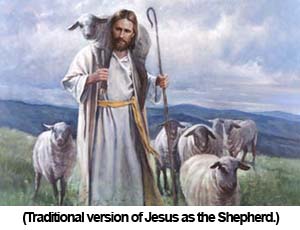 Psalm 23
Psalm 23
“The Lord is my shepherd, I lack nothing.
He makes me lie down in green pastures,
he leads me beside quiet waters,
he refreshes my soul.”
(Biblegateway link: Psalm 23)
Godfrey started off by saying, (and I’ll paraphrase most of this that comes next)
“Now I’m not sure many of you have had an experience being a shepherd, (Godfrey is quite clever and quick-witted.) but I do.
My brother and I were shepherds growing up. We cared for many animals. And I love the stories of Jesus in the New Testament where he talks about being a shepherd, because I know what that is like. I especially like the part where Jesus uses an example of the shepherd who finds the young sheep and puts it 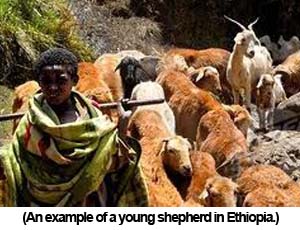 across his shoulders. I remember seeing my brother pick up a sheep and place it across his shoulders when it was weak. It is a true thing. Shepherds do that. . . . I love that story, because I have been carried by Jesus like that.”
across his shoulders. I remember seeing my brother pick up a sheep and place it across his shoulders when it was weak. It is a true thing. Shepherds do that. . . . I love that story, because I have been carried by Jesus like that.”
“When I was very little, I was one of the few people I knew who was born in a hospital in Uganda. My father had a very good job at a financial institution, and we lived well. But when I was very young, my father lost his job and life changed dramatically for us. We had to move out from the city to the rural area.
There were few jobs. We were very poor. We tended animals because that was the only way we could make money. These animals were so valuable. They were our assets. They were worth more than our house. Once, when I was very sick, we couldn’t go to hospital, because we didn’t have the money, and my father would not sell an animal for the money.
“I did well in grade school. In fact, I did so well that I earned the highest marks on my national tests that I could attend an excellent private Christian school. The only problem was that we did not have money to send me there. I was so mad at my father for not selling an animal to pay for my schooling. I was devastated. I prayed to the Lord to help me study at this school. I tried everything I could to find a way to pay for the entrance fees and tuition. I spoke with 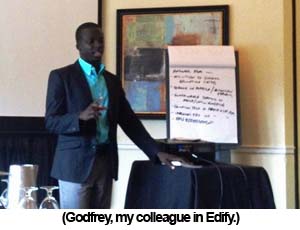 the director about a scholarship and he told me that the only way to receive a scholarship was to repeat certain grades of middle school and perform well so that I could attend high school. I was so disappointed, but I knew that this was the Lord’s plan for me and I should accept it.
the director about a scholarship and he told me that the only way to receive a scholarship was to repeat certain grades of middle school and perform well so that I could attend high school. I was so disappointed, but I knew that this was the Lord’s plan for me and I should accept it.
“I repeated three grades so that I could attend this school. I was so ashamed to be seen by my classmates who were in the grades above me. They tease me, “Godfrey, if you are so smart, why are you three grades below us?” I kept praying to make it through because I knew that this was my way to a good education.
“Jesus carried me through this period, and I made it to high school, and I did well. I did so well that I got to go to University. I studied business and I got a wonderful job after University. My life was fully changed. I never stopped praying to my Lord, I never stopped being thankful for his faithfulness to me.
“The reason that I am standing here today is because I am a product of education. I am so grateful to be standing here before you. Grateful to the Lord for all he has done in my life, and grateful to Jesus, for his work and his life, and for his gift of salvation.”
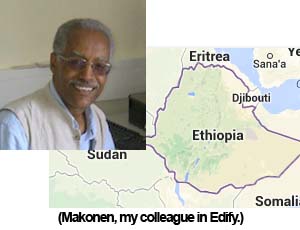
[What’s equally amazing is that our Chief Transformation Officer and Vice President of Program Assessment, Mokonen Getu, was once a shepherd boy in Ethiopa. He has an inspirational story of his long journey from the pastures of Ethiopia to the halls of higher education. He got his PhD in International Development from the University of Stockholm, Sweden. His amazing journey is detailed in his autobiography. (You can read more about him in Edify’s 2013 annual report.)]
———-
I am still in awe when I think about Godfrey’s story. When I hear about the valleys he walked through to make it to where he was, it makes me proud simply to know him and have him on our team in Rwanda. I told Godfrey how amazing his story was. He is very humble and approaches everything with a smile. He brushed off my compliment and said he enjoyed my presentation on Peru.
A little later on in the meeting he told us that he wants to get more involved at his church. While he does music and 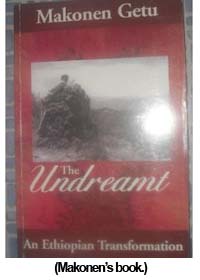 evangelization, he’d like to get back in the pulpit. (What a guy!)
evangelization, he’d like to get back in the pulpit. (What a guy!)
—
But right now, let me return back to us sitting around the multi-international table at the restaurant:
Later on in the meal Godfrey turns to me and says, “Aaron, may I ask you a question? I need your help.”
(I wondered what came next.)
“It is my first time in America and I think right now I want to order a hamburger. But we are at a fish restaurant. I think I should order fish.”
“I think that’s a good call. Do you like fish?”
“Yes, I like fish. In fact, I ate shark in Colorado. Have you eaten shark?”
“Wow, you had shark? How was it?”
“It was good. It tastes like chicken. But I don’t think I want shark right now.”
“How did you eat shark in Colorado?”
“We made a stop for Edify for two days for some meetings, and I got to visit a University.”
I tried not to laugh at the strange connection of those statements, and when he saw me smile he said,
“Yes, it was strange. I believe there are no sharks in Colorado. Nowhere close.”
We both laugh about it. I walk him through a few “American” choices. He continued later telling me that part of the reason for the stop is for him to see the university and sign up for the online MBA program at Colorado Christian University.
“It is such a great opportunity Aaron. I am so excited to start. I love education.”
. . .
Godfrey’s story and Makonen’s story are yet more reminders of why I work for Edify, and why I am excited to open the program here in Lima, Peru. Their stories are incredibly unique, yet share so many common threads with stories of adults I’ve met throughout the past three years working in Latin America. To believe there is hope, to believe that there is a God who has a plan, to believe that there was a man Jesus, the Great Shepherd who walked among us – who carries us when the burden is too great – is to know that 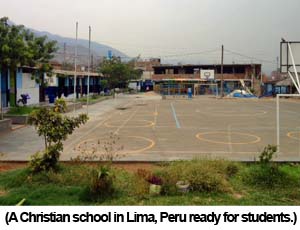 there truly is a pathway out of poverty.
there truly is a pathway out of poverty.
I know there are still millions of children here in this country of Peru who walk through valleys and are looking for a pathway up and out.
. . .
I pray that we would all see the value in education, and that we would find ways to take advantage of the opportunities that we have.
Blessings to you all,
-Aaron
———————————————————————————————
January 2013 Update

Aaron Roth – Edify.org – “Education is a Battle for the Mind“ – Jan. 2013
Hi family and friends, I just celebrated my 30th birthday here in Nicaragua during the last week of January. I felt really blessed to be able to hike around a volcano and swim in a lagoon of a volcano crater. Yes, I realize that sounds pretty absurd and possibly like fiction, but Nicaragua is a beautiful country with many volcanoes and natural points of interest. If you feel like celebrating your birthday here, just respond to this email. Blessings, -Aaron
- Download this email as a pdf: Aaron Roth – Jan. 2013 Update.pdf
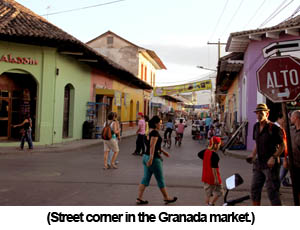
At precisely the moment the money changer was explaining to me where a large evangelical church was located in Granada, a woman and her daughter walked up to him and unrolled a $100 American bill. He pulled out his calculator, performed a calculation of the bank rate for that day and showed her the numbers. She nodded “yes.” Her face was downtrodden and her daughter looked ambivalent. The enormous stack of bills in his hand flipped back and forth as he plucked out the colorful currency from large denominations to small. It sounded like a oft repeated rhythm here on this busy street corner.
She received her Cordobas (Nicaraguan currency) and they walked away. He continued with the directions to “La Iglesia de Restauracion” (The Church of Restoration) as if nothing outside our innocent conversation had transpired.
I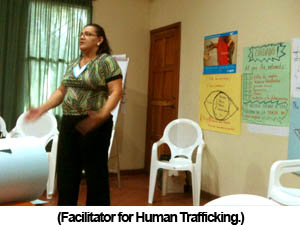 don’t know exactly where this local woman had gotten such a large bill, but I think I can connect the dots in this particular situation. Like in many impoverished countries, with the high frequency of tourism and enormous economic poverty, women sometimes engage in prostitution. I don’t want to give you the impression that this is what Nicaragau is like throughout the country or what it should be known for. That would not be true, nor would it be a fair representation to the beautiful countryside and Nicaraguan culture I have come to enjoy over the past month. Indeed, it is a complicated issue, an economic pressure driven by the divide between the rich who are in power limiting free market commerce from taking shape and the desperate poor waiting for more jobs.
don’t know exactly where this local woman had gotten such a large bill, but I think I can connect the dots in this particular situation. Like in many impoverished countries, with the high frequency of tourism and enormous economic poverty, women sometimes engage in prostitution. I don’t want to give you the impression that this is what Nicaragau is like throughout the country or what it should be known for. That would not be true, nor would it be a fair representation to the beautiful countryside and Nicaraguan culture I have come to enjoy over the past month. Indeed, it is a complicated issue, an economic pressure driven by the divide between the rich who are in power limiting free market commerce from taking shape and the desperate poor waiting for more jobs.
According to the UN, Nicaragua is the second poorest country in the Western Hemisphere next to Haiti. Nicaragua struggles with unemployment, poor education, and a weak (but growing) economy. I do believe there is hope on the horizon though, as I’ve met with many churches, Christian missionaries, development organizations, and Christian and Catholic schools. They speak of a population moving out of poverty and the importance of the formation of good character as the nation continues to grow economically.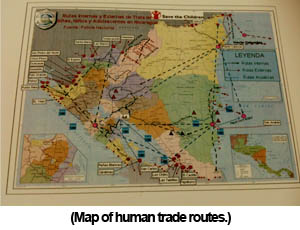 Progress may be slow, but it is arriving.
Progress may be slow, but it is arriving.
I joined a group meeting last Wednesday of an organization called ACECEN (Association of Evangelical Christian Education Centers of Nicaragua) is proactive in it’s approach to changing the culture and the future of Nicaragua through education. They teach teachers how to educate children through learning modalities, technology in the classroom, and creating a curriculum that both imparts Biblical values and lives them out. I began to see what a powerful force education can be here.
Within their network, they deliver their program of training on a bi-weekly basis to schools and weekly to others. Many times they incorporate special subjects like preventing child trafficking throughout Central America in a partnership with Christian Reformed Church (www.crcna.org). As you look to the map here on the right you’ll see that there are trade routes running in and out of this part of the country. As mentioned before, the drug trade, human trafficking, and illicit activities are not just problems of Central America, they are found in every part of the globe where there is poverty.
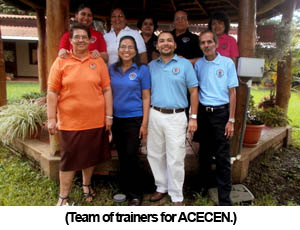 With Edify I have been visiting schools and meeting with organizations like ACECEN to see if they’d be a good partner for Edify as they currently work with Christian schools in Nicaragua. ACECEN “promotes the development and improvement of Christian schools, preparing students to excel professionally based on biblical principles so that they become agents of transformation in society.”
With Edify I have been visiting schools and meeting with organizations like ACECEN to see if they’d be a good partner for Edify as they currently work with Christian schools in Nicaragua. ACECEN “promotes the development and improvement of Christian schools, preparing students to excel professionally based on biblical principles so that they become agents of transformation in society.”
The ACECEN team was receiving this special training to impart their program of educational services to the 150 schools in their network. They will carry this message of justice, hope, and redemption to directors, teachers and students. By starting with the youngest children they are laying a platform to help them understand what is good and what is bad in the world and how to know the difference.
Isn’t it amazing that education can become a weapon in preventing things like the drug trade, child trafficking, and prostitution? It all starts with providing a solid foundation of values and one value that ACECEN continually promotes is that school is a safe place and the teachers are protectors and believe in the students ability to succeed.
I think sometimes we have this image in our minds that the evils present in our cities or in the developing worlds are always shady looking strangers that pluck out kids from their homes and put them up to selling drugs or get them involved in illegal activities. Very often, it’s not a presence or a force of bad examples, it can be simply a lack or an absence of the good ones. The values of culture, whether good or bad, are transmitted in the street, within neighborhoods, in markets, on TV and radio, all play a part in helping to form what is good and what is right in these young minds.
If we don’t help provide good solid examples of strong, loving leadership, children will find examples of it as soon as they leave school. That is what scares me. Haven’t we seen too many evils against children, and worse, youth against youth? There is a real and present battle for the minds of the youth, and I am encouraged to see organizations like ACECEN are out on the front lines loving children and teaching them how to live in this world.
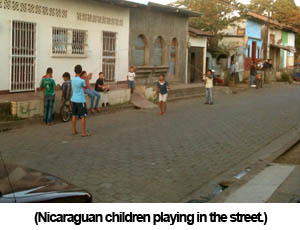
That is our goal with Edify as well. We work with schools to help them provide a better education to their children, better routes to get sustainable employment through vocational training, and bring the hope of a real Savior who came to fight for them and defeat that which is evil.
I believe children need that.
Jesus said, “Let the little children come to me, and do not hinder them, for the kingdom of heaven belongs to such as these.” (Matthew 19:14 NIV)
I pray that as you see opportunities to help the most innocent of our society, God gives you a way to participate.
Blessings to you and your families,
-Aaron
———————————————————————————————
January 2012 Update:
Aaron Roth Support Letter for HOPE International 2012
A day before I left the Dominican Republic to come visit for Christmas, I had the opportunity to enjoy a Christmas celebration meal with the HOPE’s on-the-ground partner, Esperanza Internacional. I was sitting next to the staff that works in the northern part of the capital. Ramona Gonzales had just been named loan officer of the year for the country, and in her acceptance speech she said, “None of this has been my own effort. I am grateful to the Lord for his strength and his grace, and also to my teammates, my friends and coworkers of my office.” Ramona visits all her 500 microfinance clients on a bi-weekly basis. She was my first microfinance teacher, and most importantly, taught me that it’s not just about making micro-loans.
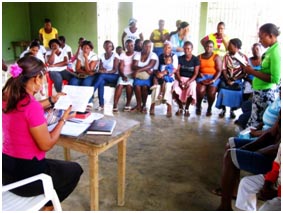 Yes, we provide small loans to individuals, but I believe, just as Ramona does, that the real work comes in the relationships we build. The real work of Hope is forged in friendships, in conversations, in prayers, in walks to and from home. I have met hundreds and hundreds of people that rely on our financial and educational services, and they are incredibly grateful for our partnership as we work together to overcome the crushing force of poverty. Quite often we are the only organization that travels to these remote communities to visit them because HOPE believes in this work, and I do too.
Yes, we provide small loans to individuals, but I believe, just as Ramona does, that the real work comes in the relationships we build. The real work of Hope is forged in friendships, in conversations, in prayers, in walks to and from home. I have met hundreds and hundreds of people that rely on our financial and educational services, and they are incredibly grateful for our partnership as we work together to overcome the crushing force of poverty. Quite often we are the only organization that travels to these remote communities to visit them because HOPE believes in this work, and I do too.
What the Lord has taught me over the past year serving in the Dominican Republic (DR) would be impossible to condense into a letter, but I believe it’s important to highlight a few lessons:
1) The Economic Need is Enormous, and We Can Help.
It is true, we live a nation that is blessed with economic prosperity. Even in our darkest economic slumps, we are still better off than 80% of the rest of the world that try to live on just a few dollars a day. We have the ability to attend good schools, walk around our neighborhoods safely, and drink water from the kitchen tap.
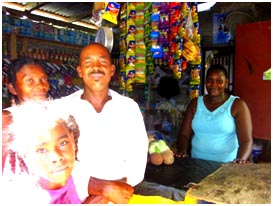 This is not the reality for the rest of the world. I’ve sat in bank meetings and spoken with our clients of HOPE about the consistent challenges of trying to provide three meals a day for their children, the expensive costs of going to clinics for medicine (usually just a few dollars), and saving enough money to send them to good schools (about $7-9 a month). They have told me, that simply by me being present with them, working with them directly and also with the people who sent me – you, my friends, my family, my church – it is an honor for them, and our work makes tangible improvements in their lives and makes them feel connected to the communities where they live.
This is not the reality for the rest of the world. I’ve sat in bank meetings and spoken with our clients of HOPE about the consistent challenges of trying to provide three meals a day for their children, the expensive costs of going to clinics for medicine (usually just a few dollars), and saving enough money to send them to good schools (about $7-9 a month). They have told me, that simply by me being present with them, working with them directly and also with the people who sent me – you, my friends, my family, my church – it is an honor for them, and our work makes tangible improvements in their lives and makes them feel connected to the communities where they live.
2) We All Work Best With Inspiration.
The work of God’s kingdom, whether locally or internationally thrives on inspiration and encouragement. Shame or guilt serves no purpose in motivating those to participate in overseas work. I know that I get to shake the hands of the grateful clients and see their smiles, but I wish that you could as well. I am grateful to be the messenger, to be your hands and feet on the ground, knowing that we all do this work unto Jesus.
35For I was hungry and you gave me something to eat, I was thirsty and you gave me something to drink, I was a stranger and you invited me in, 36 I needed clothes and you clothed me, I was sick and you looked after me, I was in prison and you came to visit me. (Mathew 25:35-36)
3) The Local Church Accomplishes God’s Work, Home and Abroad.
We meet in local churches and homes all across the country. In 10 offices in the DR and four in Haiti, we have impacted more than 50,000 people this past year in 2011. On the ground there are over a hundred local staff of Dominicans and Haitians and just five Americans. Working together as God’s local church, we believe in the mission that God wants to redeem all that is broken and hopeless, that all may know the hope manifested in his Son, Jesus who came to this Earth, and that we should shine with the joy of the Lord.
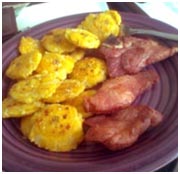
“You are the light of the world. A town built on a hill cannot be hidden. Neither do people light a lamp and put it under a bowl. Instead they put it on its stand, and it gives light to everyone in the house. In the same way, let your light shine before others, that they may see your good deeds and glorify your Father in heaven. (Mathew 5:14-16)
4) When Traveling, Eat at the Local Cafeterias with the Longest Lines.
Slight change of topic: by sticking to venues with long lines, it’s a signal that the locals approve of the food; it’s affordable, safe to eat, and most likely delicious. Many foods and fruits are seasonal, and half the joy is hearing how they describe the sweetness of a ripe mango, or the succulence of savory “mofongo” with roasted pork 😉
5) Hearing Someone’s Dreams for the Future is all the Motivation I Need.
Sometimes I find myself spending an extra hour in a school talking with a teacher or a student about their goals and aspirations for the future. I’ve realized that there’s something contagious about hope. When I hear someone really share what’s on their heart, I too get a taste of the joy and excitement for that day when they graduate from high school, make a better home for their family, or even attend a university. Hope keeps us all moving forward, you know?
My Role as a Dominican Fellow in 2012
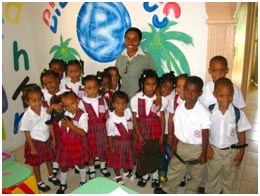 As I have mentioned in my monthly newsletters, I have been working in the area of educational program for Christian schools throughout the island of the DR. My role with HOPE in 2012 will be to continue to work in the partnership with Esperanza Internacional and a Christian Microlending organization called Edify to help build more classrooms and computer labs in Christian schools throughout the poorest communities in the DR.
As I have mentioned in my monthly newsletters, I have been working in the area of educational program for Christian schools throughout the island of the DR. My role with HOPE in 2012 will be to continue to work in the partnership with Esperanza Internacional and a Christian Microlending organization called Edify to help build more classrooms and computer labs in Christian schools throughout the poorest communities in the DR.
We have built classrooms and made improvements in 20 schools and have started programs for Biblically-based curriculum and training resources for administrators and teachers throughout the country. Over 2,700 children have been impacted by our work and thousands more will have the opportunity to attend a good school, learn about the love of Jesus, and learn the skills they need to thrive in school and beyond.
Timeline & Resources
As I prayed about my plans for 2012, I was led to continue serving in the DR as a full-time volunteer. HOPE has established a budget for the 8 months I will be in the country. I will need $900 a month for living costs in the capital city of the DR, Santo Domingo. I am asking friends and family to prayerfully and financially support me in this opportunity to participate in the work of the Lord.
I’d like to follow up with you about this letter within two weeks. Any amount you give is tax deductible, and you can find information about writing a check or donating online listed below. Some of my supporters have found it easier to make a small donation ($15, $25, or $50) with their credit card that recurs every month, you can find out about that below. If you’re interested in knowing more about HOPE International’s work in the world and the Dominican Repubilc, I’d love to talk with you about it over email, Skype, or a fresh cup of Dominican coffee – I know a great spot!
I hope you’ll consider coming alongside me in what God is continuing to do in the DR. I am excited for the opportunity to serve again with HOPE International in the Dominican Republic in 2012. My prayer for you is that God would encourage and inspire you every day, like He has this past year for me, and that you will listen to His Spirit moving in your life.
Bendiciones y que Dios les bendiga mucho,
-Aaron Roth
aroth@hopeinternational.org
(540) 421-8683
Skype: aprothwm05
Web: www.AaronRoth.net
————————————————————————————————————————————-
Schedule: 2010 – 2011
 August 2, 2010 – August 10, 2010 – Managua, Nicaragua: Casa Bernabe Orphanage
August 2, 2010 – August 10, 2010 – Managua, Nicaragua: Casa Bernabe Orphanage
 The Casa Bernabe, Veracruz orphanage complex is a Christian ministry of Verbo Christian Church in Managua, Nicaragua. It is a children’s home for orphaned, abandoned and neglected children ranging in age from three years old to late teens. The Casa Bernabe complex has grown from a handful of small, thinly-walled, dirt-floor buildings to a fully functioning children’s home. There are currently 60 children living at the orphanage, but it has the physical capacity to care for over 100 children. The orphanage is operating on a budget of approximately $175 per month per child.
The Casa Bernabe, Veracruz orphanage complex is a Christian ministry of Verbo Christian Church in Managua, Nicaragua. It is a children’s home for orphaned, abandoned and neglected children ranging in age from three years old to late teens. The Casa Bernabe complex has grown from a handful of small, thinly-walled, dirt-floor buildings to a fully functioning children’s home. There are currently 60 children living at the orphanage, but it has the physical capacity to care for over 100 children. The orphanage is operating on a budget of approximately $175 per month per child.
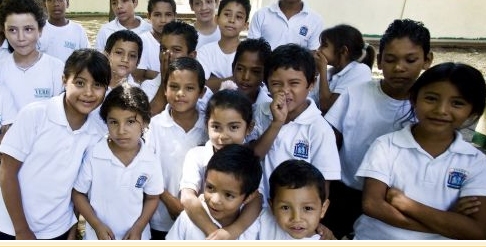
Verbo’s operational focus is to provide children with a loving Christian environment, education, good nutrition, and vocational training. There are three components to the orphanage’s vocational training program – the working farm, bakery and bike shop. We have maintained and slowly grown Casa Bernabe’s vocational training capacity over the past few years.
 August 2010 – November 2010 – San Pedro La Laguna, Guatemala
August 2010 – November 2010 – San Pedro La Laguna, Guatemala
I’ll be attending the San Pedro Spanish School, www.sanpedrospanishschool.org, near Lake Atitlán in Guatemala. Here’s what they have to say:
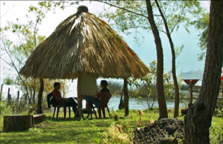 “Our methods of teaching are interactive suiting to your own personal needs with concentration on communication. After many years of experience our staff has developed a wide range of teaching materials to teach Spanish as a foreign language. We cater to different needs of the student such as Spanish for traveling, business, medical or education reasons.
“Our methods of teaching are interactive suiting to your own personal needs with concentration on communication. After many years of experience our staff has developed a wide range of teaching materials to teach Spanish as a foreign language. We cater to different needs of the student such as Spanish for traveling, business, medical or education reasons.
Our Spanish courses consist of one-on-one between the teacher and the student. You can enroll in different levels from beginner to advanced. There is the option to examine your starting level when you enter the courses so it can adapt to your necessities and qualifications and improve every area of your instruction.”
 January 2011 – December 2011 – Santo Domingo, Dominican Republic
January 2011 – December 2011 – Santo Domingo, Dominican Republic
Kevin Greene, the associate pastor of my church, told me about HOPE International, a Christian-based not for profit that specializes in economic development in places where people are considered the worlds most poor. The mission of HOPE is to provide small loans for people buy things like sewing machines, livestock, cooking materials, and business equipment that allows them to produce goods to sell in a local market. These small loans help to double or triple the daily income that a person makes – which is enough to send children to school, provide shelter and put food on the table. These entrepreneurs earn respect for themselves in the community and learn the business skills that last a lifetime, which effectively breaks the cycle of poverty for good.
 HOPE International is one of the few microfinance organizations that has a Christ-centered philosophy. HOPE’s mission with every partner bank is to make the operation sustainable through financial profitability, and currently, HOPE reports a 98% repayment rate worldwide with its lenders. HOPE’s programs teach skills to prosper in this life, but they actively share the truth of life beyond the daily struggle of poverty and the hope they can find in Jesus.
HOPE International is one of the few microfinance organizations that has a Christ-centered philosophy. HOPE’s mission with every partner bank is to make the operation sustainable through financial profitability, and currently, HOPE reports a 98% repayment rate worldwide with its lenders. HOPE’s programs teach skills to prosper in this life, but they actively share the truth of life beyond the daily struggle of poverty and the hope they can find in Jesus.
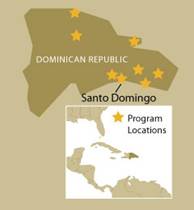 This is why I signed on with HOPE to volunteer in the Dominican Republic for a year. I know I can volunteer and serve most anywhere, but I want to see how God can use me by volunteering in a local bank that assists the local community by providing access to desperately needed credit and proclaims God’s goodness and redemption to their struggle through the truth of his son, Jesus. And of course, I’m quite excited to work with HOPE International and their partner organization, Esperanza Internacional, in the Dominican Republic.
This is why I signed on with HOPE to volunteer in the Dominican Republic for a year. I know I can volunteer and serve most anywhere, but I want to see how God can use me by volunteering in a local bank that assists the local community by providing access to desperately needed credit and proclaims God’s goodness and redemption to their struggle through the truth of his son, Jesus. And of course, I’m quite excited to work with HOPE International and their partner organization, Esperanza Internacional, in the Dominican Republic.
